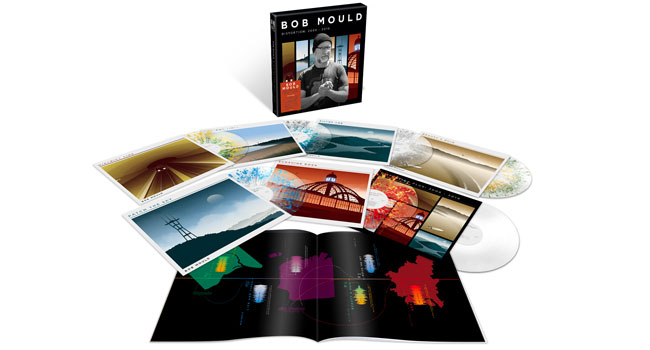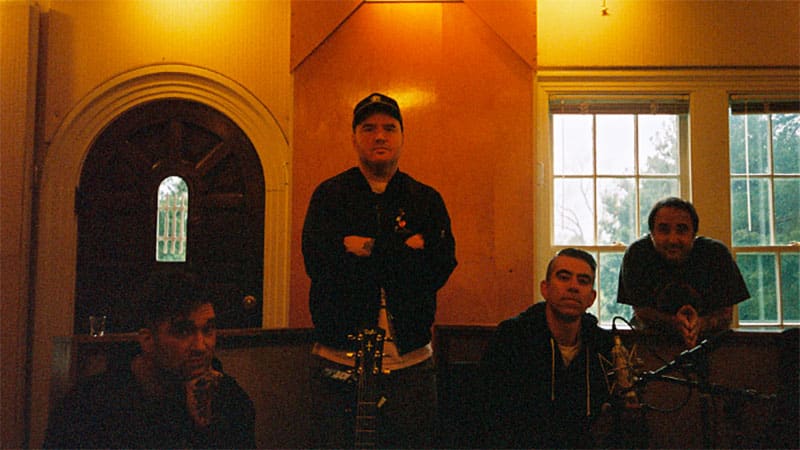Third box and best of compilations available April 16th
On April 16th, Demon Music Group will continue their year-long Bob Mould reissue campaign with Distortion: 2008-2019, the third of four vinyl box sets chronicling the solo career of the legendary American musician. It follows hot on the heels of October’s 8 LP Distortion: 1989-1995 box set, which took in Mould’s early solo outings as well as his records with the much-beloved Sugar, January’s 9 LP Distortion: 1996-2007 box set continuing through the next steps in Mould’s solo career and his outings as LoudBomb and Blowoff, and the 24 CD Distortion: 1989-2019 box, which covers the entirety of his post-Hüsker Dü output up to 2019’s Sunshine Rock.
Distortion: 2008-2019 follows Mould through a number of standout records that include some of his most celebrated work – collected here are District Line (2008), Life and Times (2009), Silver Age (2012), Beauty & Ruin (2014), Patch the Sky (2016) and Sunshine Rock (2019), as well as a bonus disc Distortion Plus: 2008-2019, which features Mould’s collaborations with Foo Fighters and Butch Walker plus the 2019 single “I Don’t Mind.” It comes pressed on clear vinyl with an etched B-side.
As with the previously released box sets in the Distortion collection, each album in the set has been mastered by Jeff Lipton and Maria Rice at Peerless Mastering in Boston and is presented with brand new artwork designed by illustrator Simon Marchner and pressed on 140-gram clear vinyl with unique splatter effects. The box set includes a 28-page companion booklet featuring liner notes by journalist Keith Cameron; contributions from J Mascis and Shirley Manson; lyrics and memorabilia.
Meanwhile, also seeing release on April 16th via Demon are 2 LP, 2 CD and 4 CD Distortion: The Best of 1989-2019 compilations – the first career-spanning compilations of Mould’s solo recordings, all of which were compiled by the man himself. Gathering 24 tracks (2 LP), 32 tracks (2 CD) and 73 tracks (4 CD) respectively, the sets collect the cream of the main Distortion boxes and offer a fascinating glimpse of a musician at the vanguard of his field for over four decades. The 2 CD edition also includes a 16-page booklet with a new essay by Cameron and artwork by Marchner, while the 4 CD version comes with a 32-page companion that includes all of the above alongside a foreword by Fred Armisen and contributions from Richard Thompson, Bethany Cosentino and Shirley Manson. Both compilations will also be available digitally via all DSPs and iTunes. The audio on the compilations has been mastered by Jeff Lipton and Maria Rice at Peerless Mastering in Boston.
“It’s called Distortion because it describes the music and it fits the world we live in,” says Mould of the box sets. “In this new age, everybody shares their life in real time. But I’m not done yet. If I didn’t have a constantly active career, this anthology might feel like the proverbial dirt landing on top of my coffin — though somehow I seem to be able to crawl my way out of the dirt every time!”
“In 1989, Bob Mould was already a renowned figure, thanks to his trailblazing work with Hüsker Dü: the Minneapolis trio which refracted ’60s pop melody through the discord of hardcore punk, creating a new language that Pixies and Nirvana would subsequently teach the world to sing. With his debut solo album Workbook, however, Bob Mould amazed his audience with its pastoral beauty and contemplative tone,” Cameron offers.
He continues, “It would be the first in an ongoing series of artistic transformations, each profoundly shaped by Mould’s sensitivity to his environment. In 1992, he formed Sugar, a band whose debut album Copper Blue earned both critical plaudits and a long overdue popular dividend. Just three years later, with Sugar at its commercial peak, Mould ended the band and made a self-titled solo record mapping the most nakedly personal path down a road already hallmarked by unsparing self-expression. He shocked then confounded fans by announcing his retirement from rock music in 1998 and re-emerging in the new century as an experimental electronica artist and successful DJ, whose club night Blowoff became a phenomenon across the US. By the end of the ’00s, Mould had found a harmonious accommodation between his musical selves, and in 2012 released the catalytic Silver Age, made with his latest power trio configuration, and heralding a resurgent decade. A succession of albums up to 2019’s Sunshine Rock followed, each one a real time/real life distillation of fearless artistic vision and a master craftsman’s skill.”





